Climate and the Biden Transition
Air Date: Week of November 13, 2020
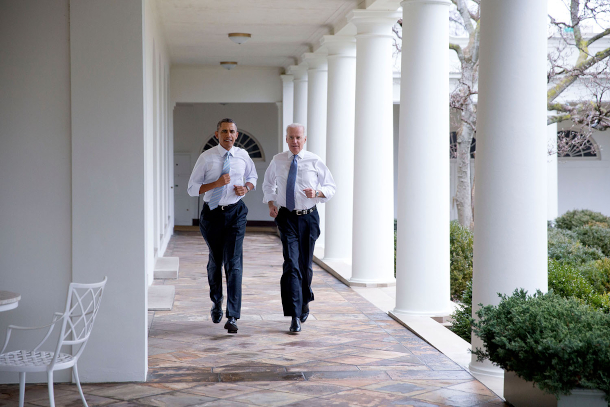
President-elect Joe Biden and his transition team have to move quickly now to hit the ground running on climate change from Day One of his presidency. Seen here in 2014, then-President Barack Obama and Vice President Joe Biden hustle along the Colonnade of the White House during a “Let’s Move!” video taping. (Photo: Official White House Photo by Pete Souza)
Along with climate action President-elect Joe Biden has pledged to rectify COVID-19, the economy and equal justice, goals that he can help achieve by getting strong start to his presidency in the transition process. Joe Aldy is a Harvard economist and veteran of the Obama White House and joins Host Steve Curwood to discuss how the Biden transition team can best plan to fight climate disruption after four years of policy disruption.
Transcript
BASCOMB: From PRX and the Jennifer and Ted Stanley studios at the University of Massachusetts Boston, this is Living on Earth. I’m Bobby Bascomb.
CURWOOD: And I’m Steve Curwood.
By January 20th President-elect Joe Biden has to figure how to make nearly five thousand appointments of people to lead the federal government, and how to budget some five trillion dollars next year to get all the work done. Top priorities are Covid-19, climate, the economy and equal justice. The transition to power takes planning and coordination, but as we go to air, the Trump administration is making false claims of election fraud and denying Mr. Biden access to key government agencies and their information. And the Biden Harris transition crew also has to juggle plans in the face of not knowing until January 5th or so whether the Senate will have a friendly or oppositional majority in power. Joe Aldy joins us now to discuss how the Biden transition team can best plan to fight climate disruption. Professor Aldy is an Harvard economist and veteran of the Obama White House. Welcome back to Living on Earth, Joe!
ALDY: Thanks, Steve. It's a pleasure to be here.
CURWOOD: Now, I understand you worked on the transition team for the beginning of the Obama-Biden administration. What was that like?
ALDY: Well, it was an incredible experience working for then President-elect Obama. But it actually began a few months before the election, there was a small group of us focused on energy and environmental policy, who began working about three months before the election. And then once President Obama was elected, we then moved into the headquarters for the Presidential Transition Team and started working with the entire staff who were trying to stand up a new administration for then President Elect Obama.
What is becoming clearer each hour is that record numbers of Americans — from all races, faiths, regions — chose change over more of the same.
— Joe Biden (@JoeBiden) November 7, 2020
They have given us a mandate for action on COVID and the economy and climate change and systemic racism.
As he aims to tackle 4 key issues facing the nation, each no small task, President-elect Joe Biden needs a smart transition team to lay a strong foundation for action on them.
CURWOOD: And after that you stayed in the White House for a while.
ALDY: I was honored to then move I started January 21, of 2009, working in the White House at both the National Economic Council and the Office of Energy and Climate Change, and did so for the first two years of the Obama administration.
CURWOOD: So to what extent do you think that President-elect Biden has followed that model working actually, on these issues well before the election and assembling a team?
ALDY: Well, I think it's clear, they started laying the groundwork and thinking through the key staff who would help organize and run a transition even before the election. And, and part of that is, standing up a new administration is an incredible amount of work. And so it's important to do your homework and be prepared, especially when we think about the daunting challenges that the President-elect faces, because of the COVID pandemic, the state of the economy, the nature of race relations across the country, and certainly, as President-elect Biden has noted, the climate crisis that we need to confront.
CURWOOD: Some people say that it's important to have a "whole-of-government" approach to dealing with the climate, because it touches so many things, from economics to equity, along with health, and, of course, the very science and technology of dealing with climate disruption.
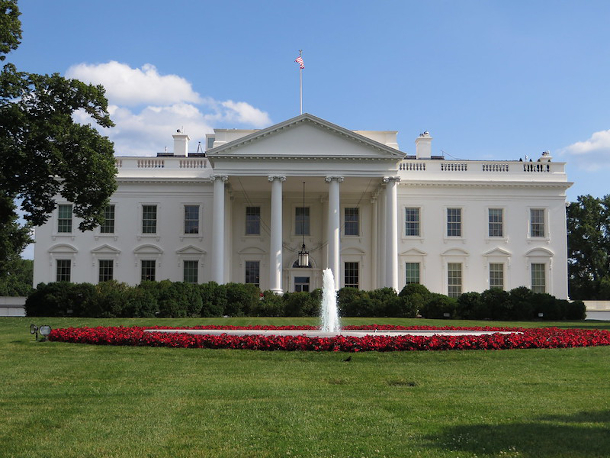
Joe Aldy and other people involved in the Climate 21 Project have recommended that the Biden administration create a National Climate Council within the White House to coordinate a “whole-of-government” approach to the climate crisis. (Photo: Ken Lund, Flickr CC BY-SA 2.0)
ALDY: I think it's critical to have a whole-of-government approach. And it's critical, because you're right, that climate change does impact and climate change policy will impact virtually every corner of our society. So it's important to have someone, say, at the Pentagon, who does procurement, to think about the decisions they make, that can actually help create markets for new energy technologies. It's important to have someone at, say, the Department of Housing and Urban Development, to think about their policies that affect housing infrastructure, to ensure that it is A, resilient to climate change shocks, but also B, that we make the kinds of investments in our housing, that can improve their energy efficiency, can improve their use of solar power, could actually make sure that we're all sharing in the benefits of a clean energy transition. So it's not just thinking, what does the EPA Administrator do or the Secretary of Energy, but really every part of the government is going to be critical. And I think one role that's going to be especially important going forward in this first year of a Biden administration, is to think through what the Secretary of the Treasury, perhaps the director of Office of Management and Budget, the chair of the Council of Economic Advisors, they're going to be the economic advisors helping President Biden think through economic recovery as we try to create new jobs and come out of the COVID recession. And so I think it's going to be critical that how you think about aligning investments in clean energy, aligning investments to improve our resilience to climate change. That's part of that economic recovery package. I think when we look back at the experience in 2009 one of the big things we worked on in the presidential transition, in fact, we were negotiating with congressional staff during the transition period, were on the clean energy components of what became the American Recovery and Reinvestment Act, the major stimulus bill that was signed into law in February of 2009. Then, we spent about 100 billion dollars on clean energy. And I think we had some really incredible success stories, when we look at how much wind and solar has been invested and how much the cost of those technologies have come down, in part because of the support through the Recovery Act. But what we've seen is President-elect Biden's laid out a much more ambitious spending agenda on climate change. And I think you can try to make a key component of that in what will be the economic recovery package. So I think that's the sort of first step of what's going to have to be a number of major policy steps to try to deliver on the ambitious climate change goals he's laid out.
CURWOOD: So the new president and his administration will have a great deal of discretion over executive actions, regardless of which party ends up controlling the Senate. So talk to me about some of the first actions you anticipate the Biden administration will make on climate?
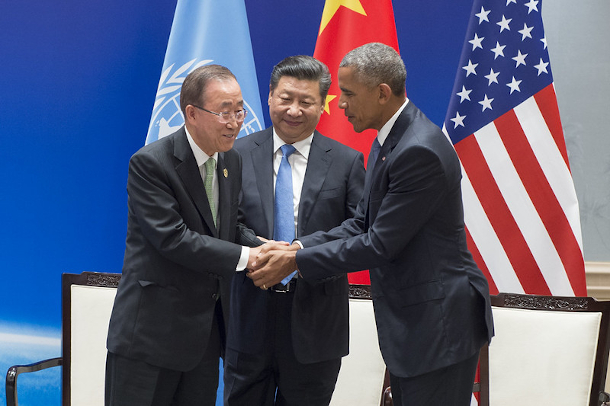
UN Secretary-General Ban Ki-moon (left) shakes hands with then-US President Barack Obama (right) during a 2016 celebration of China and the United States joining the Paris Agreement, as China’s President Xi Jinping (center) looks on. The Biden administration will need to rebuild trust and relationships with other countries to lead on climate. (Photo: Eskinder Debebe / UN, Flickr CC BY-NC-ND 2.0)
ALDY: Well, the first thing they'll do is they'll stop any pending regulatory processes related to climate, but they'll probably do that across the board, that's actually kind of a standard operating procedure for a new administration, that they, they sort of stop the sort of midnight rule making processes, if you will, those that are at the very end of the outgoing administration. The second thing they'll do is I think they'll look at several executive orders that Trump implemented, and rescind those, some that are focused on climate that really tried to reorient the federal government towards fossil fuels, they'll rescind those; but some that have major implications for climate, but are broader than climate. So early in the Trump administration, there was a regulatory policy executive order that effectively set a kind of regulatory cost budget, and said that any agency that wanted to do a new regulation had a strike two existing regulations. And all that does is sort of slow down the regulatory process. It really recast what has traditionally been an approach to regulation dating back to Ronald Reagan, that we look at benefits and costs. And in the Trump administration, they focused just on costs and said you can't increase the cost on industry in any new rule making. So I think they'll get rid of that executive order, which then makes it easier to think through, how do you move forward with regulations that make a lot of sense for society, where we're going to be making investments where the benefits are going to exceed the costs that are going to allow us to make significant progress in reducing our CO2 and other greenhouse gas emissions. So I think you'll see a lot of that in the early days as focused on those kinds of executive orders, that then sets the foundation for the regulatory agencies to start moving forward. And those regulatory processes do take some time, if you do them right. And if there's one thing we've learned from the Trump administration, it's that if you do your rulemakings wrong, you will lose in the courts. They did it fast, they did it sloppy. And I think that's one thing that you will see is, I think, an aggressive regulatory agenda in a Biden administration, but one that is going to be deliberate, methodical, carefully done, so it can withstand judicial scrutiny, which is going to be all the more important, given how the courts have become more conservative with the Trump appointments over the last four years.
CURWOOD: Joe, any particular executive orders that you think Biden should jump on right away?
ALDY: Well, another one that'll be important, which gets to the process, which is how does he think about organizing the whole-of-government approach? You know, so I worked as a staffer to the National Economic Council, I also spent time supporting those who worked on the National Security Council. So we have these kinds of policymaking councils within the White House. And so one idea is that you create a National Climate Council within the White House that tries to coordinate all policy efforts across the federal government that are related to climate change. I think you'd also want to think about how you would design this National Climate Council to coordinate, say, with the Office of Management and Budget, when it comes time to developing the budget, so to make sure that we are truly considering and accounting for climate change throughout all of our planning on the budget; how we develop bilateral relationships, which is one of the first things that actually a new president can do to signal the seriousness on climate change. It's something we did back in 2009 with President Obama, every head of state visit he had in 2009, we had some kind of climate or clean energy deliverable, an agreement among the heads of state how we were going to each take actions to move forward on climate change. So I think a National Climate Council could help make sure that everything the government is doing is really advancing the President's agenda on climate change.
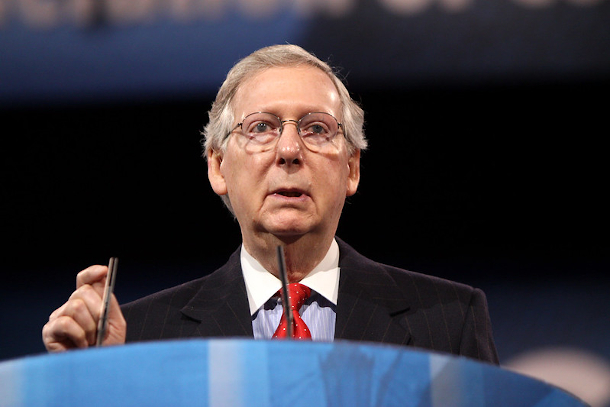
Senate Majority Leader Mitch McConnell (R-KY) has blocked many Democratic-led House bills including those for climate action from even reaching the Senate floor. (Photo: Gage Skidmore, Flickr CC BY-SA 2.0)
CURWOOD: Let's talk about the international agenda right now. I mean, I assume that President Biden is going to make good on his promise to bring us back into the Paris Climate Agreement. But that's sort of the very least that can be done. What do you anticipate in terms of the international facing part of the new President's approach to dealing with the climate crisis?
ALDY: Saying that we're going to rejoin Paris, you're right, is actually the easy part. The challenge, I think, then is twofold. How do you think about describing what it is we in the United States will do to mitigate our emissions of greenhouse gases? In 2015, as a part of the Paris Agreement, President Obama put forward a mitigation pledge that the Trump administration has effectively walked away from. I think there will be high expectations for what's going to be in a Biden administration pledge. And these are pledges that countries around the world have made and in fact, the next UN climate talks to be in Glasgow, Scotland in November of 2021, are going to focus on how countries are updating and enhancing the ambition of these mitigation pledges. So I think there'll be a lot of attention focused on what the Biden administration will pledge, which then gets to how do you ensure that this pledge is credible, by illustrating the domestic actions you're going to take to implement that pledge. So there'll be a focus, I mean, I remember this back in 2009. Other countries didn't care about what exactly President Obama was saying, say, for our 2020 emissions, when we think about that in the context of the Copenhagen conference. They were focused on the details of the design of the Waxman-Markey bill in the House, they were following some of the emerging discussions about cap and trade legislation in the Senate at that time. They really care about what is in your domestic implementation. That's going to be the real challenge, I think, as the Biden administration moves forward, is reestablishing leadership internationally, but being able to demonstrate credible domestic action to do that.
CURWOOD: So it's too soon to know if there's going to be a Republican Senate or a Democratic-led Senate. To what extent does that outcome of control of the Senate affect what will be climate policy going forward, do you think?
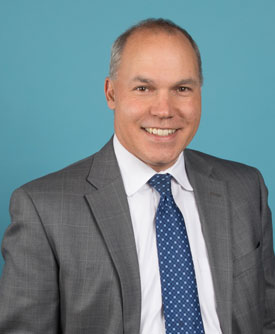
Joe Aldy is an economist and professor of public policy at Harvard’s Kennedy School. (Photo: Courtesy of Joe Aldy)
ALDY: Well, I think it's gonna have a pretty significant impact in the near term on what an economic recovery package looks like. Does an economic recovery package, does it end up being a lean package, if you have to have a Speaker Pelosi working with a Majority Leader McConnell and a Biden White House, where whatever you need to do to get to a majority of votes in the Senate has to bring along Republicans? Or do you have something where you've got, you know, it's not a lot of maneuvering if it's a 50-50 Senate. You know, that means you have to keep every single member of the Democratic caucus and the Independents caucusing with the Democrats, keep them all in line in order to have Vice President Harris break any ties if you're not bringing any Republicans on board. You know, I remember from 2009-2010, from the beginning, McConnell kept his caucus fairly well together in not wanting to support anything we were doing, whether it was the economic stimulus bill, which in the end only had a couple of Republican Senators, whether it was Obamacare, whether it was Dodd-Frank on financial reform, the fact they were never there on cap and trade legislation on climate, which is why then-Speaker Reid never brought a bill to the floor. Because while we were told there were Republicans who liked cap and trade, who had actually sponsored cap and trade bills in the past, they were told by the Minority Leader at the time, McConnell, that they couldn't vote on that legislation. So the question is whether or not McConnell is able to keep his caucus together, and really obstruct action here, or whether or not there are some Republicans who see a future where like, we've got to deal with this problem, and say, I'll work with you. Maybe we work together on something that is sort of more moderate in terms of the policy design. I'm okay if it's sort of moderate in policy design, but it actually makes progress in dealing with this problem. We've, we've had too much inaction legislatively on climate, that I'm happy to make some first steps if it sort of creates momentum and builds some broader coalition that can span the political parties for those subsequent steps that come. But the history is not all that optimistic if we look at what McConnell's done in the past. So I think, I think what happens in Georgia is actually really, really important for the future of climate legislation.
CURWOOD: Joe Aldy is an economist and Professor of Public Policy at Harvard's Kennedy School who advised President Obama on energy and the environment. Professor Aldy, thanks so much for taking the time with us today.
ALDY: Thank you, Steve.
Links
The Washington Post | “How Biden Aims to Amp Up the Government’s Fight Against Climate Change”
Living on Earth wants to hear from you!
Living on Earth
62 Calef Highway, Suite 212
Lee, NH 03861
Telephone: 617-287-4121
E-mail: comments@loe.org
Newsletter [Click here]
Donate to Living on Earth!
Living on Earth is an independent media program and relies entirely on contributions from listeners and institutions supporting public service. Please donate now to preserve an independent environmental voice.
NewsletterLiving on Earth offers a weekly delivery of the show's rundown to your mailbox. Sign up for our newsletter today!
 Sailors For The Sea: Be the change you want to sea.
Sailors For The Sea: Be the change you want to sea.
 The Grantham Foundation for the Protection of the Environment: Committed to protecting and improving the health of the global environment.
The Grantham Foundation for the Protection of the Environment: Committed to protecting and improving the health of the global environment.
 Contribute to Living on Earth and receive, as our gift to you, an archival print of one of Mark Seth Lender's extraordinary wildlife photographs. Follow the link to see Mark's current collection of photographs.
Contribute to Living on Earth and receive, as our gift to you, an archival print of one of Mark Seth Lender's extraordinary wildlife photographs. Follow the link to see Mark's current collection of photographs.
 Buy a signed copy of Mark Seth Lender's book Smeagull the Seagull & support Living on Earth
Buy a signed copy of Mark Seth Lender's book Smeagull the Seagull & support Living on Earth

